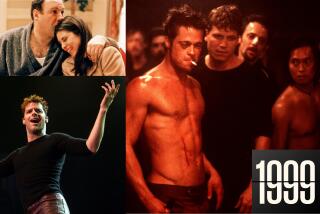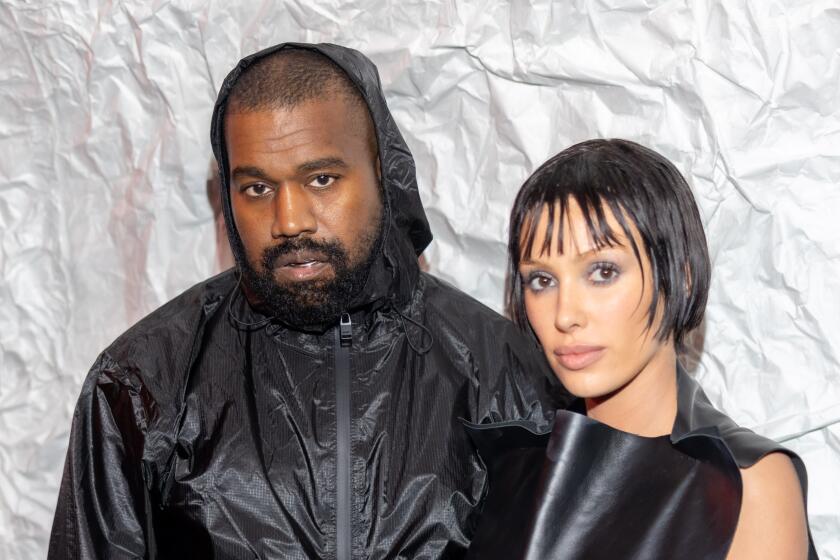Pop culture dominance is a fickle thing, even for Bowie and Kanye
On Jan. 8, his 66th birthday, David Bowie surprised music fans around the world with the announcement that he’d secretly completed a new studio album.
This was a big deal — the first record in a decade from a legendary rock star more or less thought to have retired — and wall-to-wall media coverage over the months to come reflected a pent-up desire to have Bowie back in our lives. When “The Next Day” hit stores on March 8, many critics called the album one of the singer’s best, helping it along to an impressive debut at No. 2 on the Billboard 200. The man once known as Ziggy Stardust, it seemed, had risen once again.
Or had he?
Less than six months after its release, “The Next Day” — with a title that suggests moving ever forward into the future — seems almost to have disappeared.
TIMELINE: Summer’s must see concerts
Last week the record was nowhere to be found on the iTunes album chart. It hasn’t really taken hold on the radio. And though a music video for the album’s lead single, “Where Are We Now?,” quickly racked up millions of views online, more recent clips from the record have made smaller impressions.
For the week ending Aug. 3, Google Trends rated Bowie’s worldwide search interest at 19 on a scale of 0 to 100, well below youngsters like Miley Cyrus and Skrillex as well as peers such as Bruce Springsteen.
But Bowie isn’t alone. This year a number of high-profile albums, movies and songs — pop-cultural properties that each appeared with the fanfare of an event — have had trouble gaining the kind of long-term traction that artists and their backers crave.
Think of Baz Luhrmann’s lavish big-screen adaptation of “The Great Gatsby,” which utterly dominated movie news before its opening in May but now seems like a distant memory. Or “Harlem Shake,” the thumping dance-music track by Baauer that topped the Billboard Hot 100 for five straight weeks beginning in February.
At that time, the song — the first to benefit from a shift allowing YouTube streams to help determine chart placement — felt like a harbinger of change. Yet when Baauer played it at the Coachella Valley Music and Arts Festival in mid-April, “Harlem Shake” had already started to sound like a relic.
Even Kanye West, that committed legacy-builder, saw sales of his “Yeezus” fall 80% in its second week in stores in June — “the largest second-week percentage drop for a No. 1-debuting album in over a year,” according to Billboard.
Each has been left behind by an ever-accelerating culture that demands simultaneous engagement on multiple fronts.
“Everything moves so much faster than it used to,” said Keith Caulfield, associate director of charts at Billboard. “And consumers have so many more options than ever before. So as a result it’s hard to get people’s attention today — and it’s even harder to hold onto it.”
Yet some acts have done exactly that. Last year Adele’s “21” was the biggest-selling album of 2012, a title it also earned in 2011. (It’s never left the top 50.) The Las Vegas band Imagine Dragons is all over pop and alt-rock radio right now with songs from an album it released almost a year ago.
And since he put out his smash comeback effort “The 20/20 Experience” in March, Justin Timberlake has maintained a spot near the center of the pop-culture conversation.
How to account for which titles attain a measure of what social scientists call stickiness?
PHOTOS: Celebrities by The Times
It’s not just a matter of perceived artistic quality. Critics tripped over themselves to praise “The Next Day” (though it’s drearier than its fans will admit), while Imagine Dragons’ pumped-up anthems go limp under scrutiny.
Instead, longevity seems to derive from an artist’s ability (or willingness) to “keep pounding the message,” as Steve Berman put it. The vice chairman of Interscope-Geffen-A&M Records, Berman should know: He’s part of the team that’s kept Robin Thicke’s “Blurred Lines” at No. 1 for nine weeks — the longest stint in 2013. (Last week Thicke’s latest album, also titled “Blurred Lines,” debuted at No. 1 as well.)
“Blurred Lines” is a great song, as funny as it is funky; perhaps more important, it’s a timely one, with a groove that shares retro-disco attitude with recent hits by Timberlake, Bruno Mars and Daft Punk.
But even if you hate the tune, you’ve probably had trouble tuning it out. Since its risqué video appeared on YouTube in March, Thicke has been a near-permanent media fixture — giving interviews, performing on awards shows, remaking the song with kids’ instruments on “Late Night With Jimmy Fallon.”
“Getting caught up thinking the song is gonna carry it, that’s where the danger lies,” said Berman. “It has to be about the work underneath, explaining to the audience who Robin Thicke is and figuring how to get people to continue to embrace him.”
The entertainment media are of course complicit in this effort, a sign as much of their endorsement of a given song or singer as of their unceasing need for fresh content in the age of podcasts, blog posts and Twitter feeds.
RELATED: Best albums of 2013 so far | Randall Roberts
Timberlake especially seems to understand the modern media appetite. On the heels of releasing his album he’s consistently added to the story with videos, appearances and a summer tour with Jay Z that wraps up Aug. 16 in Miami. And the plan extends through the end of the year: Next month Timberlake plans to put out a sequel to “The 20/20 Experience,” followed by an arena tour of his own in the fall. To paraphrase his hero Michael Jackson, he’s working day and night.
Bowie, by contrast, has done virtually nothing beyond his music videos to promote “The Next Day”; West too has kept promotion (of at least the deliberate variety) relatively minimal. And both men appear to have paid for their reluctance to feed the beast.
The upshot is a narrowing of the gap between art and marketing; the artists succeeding now are those capable of making one feel like the other, all-purpose entertainers at ease in the varied settings of today’s busy mediascape.
To a purist’s sensibility — one that says important work should stand on its own — this development may be something to lament, just as it was a half-century ago when “American Bandstand” effected a slower-paced version of it.
Certainly it’s regrettable in the case of, say, George Strait, the veteran country singer whose terrific 2013 album “Love Is Everything” has made little mainstream impact thanks to Strait’s general disinclination toward selling himself.
TIMELINE: Summer’s must see concerts
And it’s equally unfortunate, albeit in the opposite sense, with Jay Z, who seemed to betray his own creeping fear of obsolescence by teaming with Samsung to create an unwarranted event out of the otherwise ho-hum “Magna Carta Holy Grail.” In these and other instances, we’re being led to focus on the wrong thing — or being led not to focus on the right thing.
Sometimes, though, the demands of the market can yield thrilling results.
In a sign that even he can read the writing on the wall, West is set to break the semi-seclusion he’s been in since June, when Kim Kardashian gave birth to their daughter, with a performance later this month at the MTV Video Music Awards. It’s the same telecast where he notoriously cut off an acceptance speech by Taylor Swift in 2009.
MTV says he’ll do “Black Skinhead,” one of the most confrontational cuts on “Yeezus,” a clanging electro-punk track in which West raps, “They see a black man with a white woman at the top floor, they gonna come to kill King Kong.”
It’s hard to imagine we won’t be talking about it the next day.
More to Read
The biggest entertainment stories
Get our big stories about Hollywood, film, television, music, arts, culture and more right in your inbox as soon as they publish.
You may occasionally receive promotional content from the Los Angeles Times.







